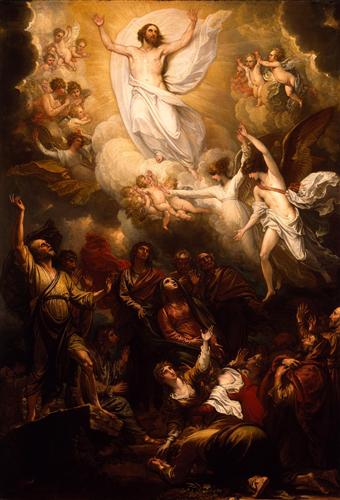
One of my favourite books on the creeds is Luke Timothy Johnson’s The Creed: What Christians Believe and Why it Matters. Johnson’s exposition is concerned with the biblical background and foundations of the Nicene Creed, and so traces these aspects with respect to each statement of the Creed. Recently I read again his exposition of the phrase “he ascended into heaven and sits on the right hand of the Father” (pp. 186-192), and came across the following comment:
The fact that Luke himself has provided two distinct versions of the same event—both remarkably restrained—liberates us from the tedious work of trying to literalize either of them and argue that the ascension is a historical event. As in the case of the resurrection narratives, let us recognize that the experience and conviction of Jesus’ exaltation are not to be identified with the story, and also that these narratives are written to suggest through their choice of symbols the deeper significance of the event (189).
I have often wondered at the two ascension accounts in Luke, with the first reported in Luke 24 as occurring on the evening of the first Easter, and the second (Acts 1) occurring some forty days later. Modern cosmology also challenges a strictly literal reading of the ascension stories since we know that heaven is not located vertically above us. But Johnson is not merely demythologising in the interests of providing an account more palatable to modern sensibilities or worldview:
Although the story of Jesus’ ascension appears in only two New Testament writings, Mark and Luke-Acts, the conviction that Jesus is now in heaven and “exalted,” and “glorified,” and “enthroned” is found everywhere in the New Testament (188).
The ascension is a remythologisation of the world. Jesus is now ascended, now enthroned, now reigning; the church are those gathered around his throne, receiving the gift and gifts of his Spirit to witness to his reign in the midst of the world. He is at the right hand of the Father, and we, in him. And so Barth says,
Christ is now, as the Bearer of humanity, as our Representative, in the place where God is and in the way in which God is. Our flesh, our human nature, is exalted in Him to God. The end of His work is that we are with Him above. We with Him beside God (Dogmatics in Outline, 125).
But not simply with God but also sent by God.
His departure means not only an end but also a beginning… Christ founds his Church by going to the Father, by making Himself known to His Apostles. … Christ is the Lord. That is what all creation, what all nations should know. The conclusion of Christ’s work is therefore not an opportunity given to the Apostles for idleness, but it is their being sent out into the world. Here there is no rest possible; here there is rather a running and racing; here is the start of the mission, the sending of the Church into the world and for the world (127).